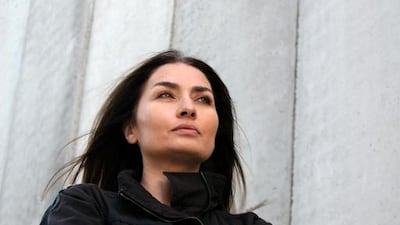Leila Sansour left Bethlehem as a teenager in the 1980s in search of a more exciting life and education in Europe, much to her father’s dismay. Little did she know then that she would return two decades later to make a film that depicts the daily difficulties of living in a city that has been under such an intricate and long-standing occupation.
Through Open Bethlehem, the Russian-born, Palestinian-raised filmmaker wanted to show the world what it's like to live beside the invasive annexation wall, which started being constructed in 2000 as a "separation barrier" – using suicide bombings inside Israeli territory during the second Palestinian intifada as a pretext. The film is a tribute to Sansour's late father, the much-respected founder of Bethlehem University.
Sansour, who planned to stay only until she could film the construction of the wall, soon became involved in a full-fledged campaign for the city she had once been so desperate to leave. What was supposed to be a one-year project in 2004 extended to almost a decade, resulting in more than 700 hours of footage.
The film – which will be screened for the first time in the UAE tomorrow through Reel Palestine, a local pop-up film festival aimed at revealing Palestinian life and culture – is a first-person account that revolves around Sansour, as the Christian-Palestinian becomes reacquainted with her native city.
In the film, Sansour is armed only with her camera and a dilapidated family car that keeps breaking down as she makes her way around the city, which she says is reflective of the Palestinian struggle to get by with very little.
“The film mirrors the struggle of people who are walking in the shoes of the weak,” she says. “There is a lot that is demanded of you as a Palestinian. You are expected to go to great lengths to get the most mundane chores done, while being diplomatically savvy and politically correct.
“The car is symbolic of how difficult it is to do that when you are denied basic rights and resources.”
Sansour says she faced many obstacles when filming raw footage of houses being demolished to make way for the wall.
“It was very difficult to film at many of the scenes of destruction,” she says. “If someone from the army sees you, you automatically have your tapes confiscated, so much of the film was snippets of what we could salvage. I once had an entire night’s worth of footage taken from me.”
During her time there, Sansour also launched the Open Bethlehem foundation, a non-governmental body that aims to promote and protect the heritage of the ancient city. "The purpose of the film gradually shifted to become an all-encompassing campaign that sheds light on the situation from every possible angle," says Sansour, who also produced the acclaimed film Jeremy Hardy vs the Israeli Army in 2003. "I felt I couldn't just make a film and walk away.
“Essentially, this is a story of collective incarceration and imprisonment. The film brings the cultural and historic roots of the old city to the fore, disqualifying myths that this was ever a barren land. On the contrary, Bethlehem is a model of coexistence in the Middle East. This is something to cherish.”
The 90-minute film was released in the United Kingdom last month and has attracted more than 25,000 viewers so far, according to Sansour, who is planning to take the film to America by the end of this year.
“It is also a very personal story, which is why it resonated with many viewers,” she says. “The film touches upon the gradual exodus of my family and many others who left Bethlehem as a direct result of the situation on the ground and not because of some inter-religious or social incongruence.”
Sansour hopes that the film will garner an international reaction strong enough to make a difference in bettering the lives of ordinary Palestinians and ending the occupation.
“We have to remind the world that we are very much there and are there to stay,” she says.
Open Bethlehem will be screened in Dubai’s Alserkal Avenue on Sunday, January 25, at 7pm. Tickets are available on a first-come, first-served basis. Visit www.reelpalestine.org

